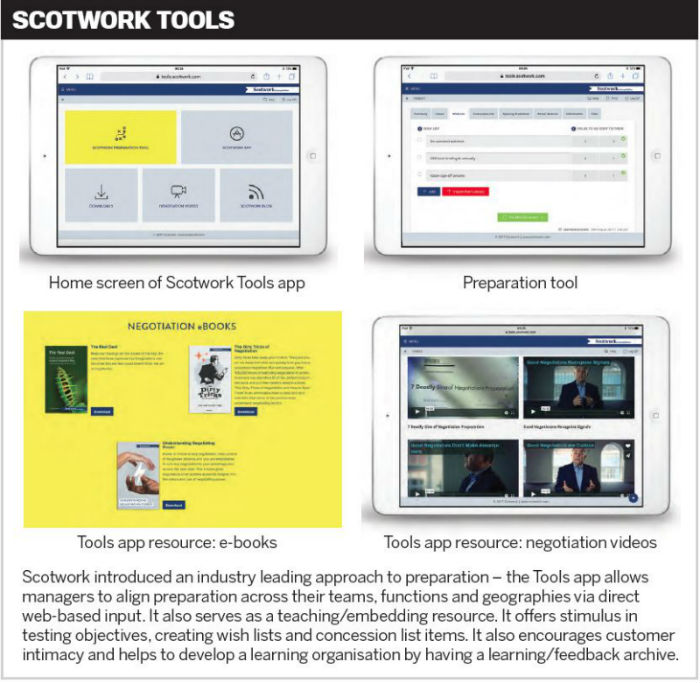Whether it’s for budget allocations, during IR consultations or simply the to-and-fro debates among internal departments, every HR professional must know how to negotiate. Is it time to upskill?

Whether it’s for budget allocations, during IR consultations or simply the to-and-fro debates among internal departments, every HR professional must know how to negotiate. Is it time to upskill?
AS HR continues to build its influence in the C-suite, so too is the profession upskilling a key element of what constitutes influence: the ability to negotiate. Negotiation skills are unique and highly specialised – and to date, they have not generally been considered a key part of HR’s skills arsenal. This may have held the profession back.
“Great strategy is too often derailed by teams lacking the skills to implement the strategy effectively, or by a culture trapped in ‘the old way we used to do things around here’ – preventing change and a lasting transformation,” says Warren G Langley CEO of Scotwork Asia, an organisation that provides negotiation skills development and consultancy in this space.
Fortunately, this is slowly changing. HR professionals have an ever-increasing opportunity to support sustainable value creation, due to their pivotal role in linking the value chain. As Langley notes, negotiation skill will support them in making strategy happen across all the teams they influence, as well as giving them greater confidence in dealing with the bread-and-butter conflicts they face every hour of every day right across the value chain.
Langley adds that it’s in HR’s best interest to upskill in this area. Without a skilled and consistent approach, even day-to-day negotiation challenges can hold HR back, not to mention the challenges facing HR when they need to negotiate with highly trained sales and procurement teams.
“If HR lack the same level of negotiation skill, how can they possibly counter the highly persuasive sales director or the procurement director who is simply not buying HR’s proposal?” Langley asks. “How can they help functional leaders spot if negotiations carried out by their teams are systemically flawed, incompetent, or crippled by a culture that doesn’t have a constructive negotiating mindset?”
Another reason to upskill…
Of course, when most HR professionals hear the word negotiation usually it’s associated with industrial relations and union negotiations. These are tough negotiations that require well-honed skills with a visibly consistent even-handed approach. Langley says such negotiations require sensitivity, emotional intelligence, and effective preparation to ensure clarity and consistency – which is difficult to achieve if the HR team lacks the appropriate process, level of skill and confidence to carry them out in a professional way.
“Scotwork are often called in when such meetings are not going well, and while it’s never too late to learn effective negotiation process and skill, often by the time the organisation realises, unhelpful precedents have been set, unnecessary concessions given away, and trust may have been lost,” he says.
While this area undoubtedly benefits from a highly skilled and confident HR team, Langley suggests HR can play a greater role in highlighting the impact of poor negotiation skill right across the value chain. In doing so, HR can be seen as more than the team settling IR issues, but rather as true guardians of the business-critical core competences.

Getting the basics right
Like most skills and disciplines, having the right foundational skills will aide in negotiation success. Langley says the same basic process and skills used in the relatively straightforward transactional negotiations are just as important in more complex strategic negotiations, but if we get the basics wrong in the big ticket negotiations, the risks and costs are obviously much higher and the consequences more long term.
For this reason, Scotwork programs build from level 1) the fundamentals of negotiation, through level 2) advancing negotiation, and on to level 3) strategic/coaching negotiations.
“Most senior managers who are already negotiating in their role, join at level 2, but often ask to skip this level as they want to join what they see as the senior strategic class and therefore more suited to them.
“Via a gentle consultative process in which we explore their understanding of core concepts, and their grasp of the core competencies and cultural norms or preferred approach to negotiation or conflict resolution, we confirm that they need to learn a robust process and effective skills first – before rushing to get all strategic,” Langley says.
It’s worth noting that senior managers rarely negotiate internally, where they have the power to impose their will, and externally they should be using their skilled and empowered teams to do it for them. They also typically avoid stepping into the day-today transactional negotiations. It’s therefore not surprising that when they enter strategic negotiations, they often lack the practice and confidence to be effective. This can result in a reluctance to negotiate, or what Langley refers to as “soft negotiations”, where the tendency is to demonstrate their power by giving away hard-earned value for less than their fair share in return.
The negotiation mindset needs to come from the top down, with senior managers rewarding collaborative, constructive and creative negotiations.
Just as important is negotiating up the hierarchy, which requires additional skills that Scotwork teaches as a module in their program.
“It often requires careful positioning to generate interest, an ability to create momentum and commitment among key stakeholders and the skills to repackage tradeable variables,” Langley says. “Our new module on Persuasive Negotiation has been developed in collaboration with Professor Hal Weitzman at the University of Chicago Booth School of Business to enable managers to deal with such challenges.”
Scotwork’s programs have the flexibility for groups to select modules that are the most relevant for them and these can range from topics as diverse as overcoming deadlock, creating value, cultural consideration, and setting the guiding principles to enable strategic negotiations, etc.
A helping hand
Scotwork offers transformation programs led by specialist consultants/coaches who are time-served negotiators and advanced subject matter experts.
Scotwork’s programs differ from one-off training sessions in that they have three critical elements: a before, a middle, and an after component.
“We believe this is necessary if the organisation is serious about the transformation and intent on sustainable development,” Langley says.
Before starting, a stakeholder analysis and an online capability survey is completed by participants. The five-page report this generates benchmarks the understanding of core concepts, core competences and cultural norms before the transformation begins.
The Scotwork e-learning module can be used to fast-track the process, but Langley says the fun really starts in the middle section, when participants spend 80% of their time in live negotiations, which are carefully analysed via constructive debriefs with a Scotwork negotiation skills coach.
Groups emerge from three days of transformation with a robust process, common language, common approach to advanced negotiation and the practical skills (and increased confidence) to carry out highly effective negotiations.
“The magic lies in the area of ‘coached debrief ’,” Langley says. “This is Scotwork’s real edge as the pioneers of this field for over 40 years, coupled with a simple and highly practical approach to implementable process and skills.”
Langley believes the difference Scotwork makes stems from its ability to teach managers “what to say and do at the negotiating table”, rather than filling their heads with the largely unhelpful theory, which might be intellectually interesting but not so easy to apply.
The final stage is all about “keeping the process and skills alive” and Langley is proud that this is where Scotwork has invested a great deal of time, effort and money over the last five years – building an industry-leading free-of-charge suite of embedding services for its alumni.
All alumni now have access to the Scotwork course app, micro learning library, ebook and whitepapers, plus a 24/7 consultant helpline, and Scotwork’s new advanced preparation tool.
This tool allows real-time preparation collaboration between team members online, with the option to invite managers and other mentors to remotely offer feedback to the preparation. The tool houses simple inbuilt functionality to support value creation and manage concessions, and ultimately builds an archive of all previous negotiations.
Close the gap
Langley has one final message for HR and business leaders. “Close the skill gap,” he urges. “It’s costing business billions every year in poor deals, unresolved confl icts, lost contracts and staff churn. And no tricks, ploys, or hot tips are going to repair the leaks across the value chain when teams can’t negotiate effectively.”
SCOTWORK
Scotwork transforms the way you do business – giving your people negotiation training that helps them hold their own and cut the right deal. Our unique methodology has made businesses more successful in over 38 countries, in 24 languages by providing people negotiation tools and skills to be more assertive, profitable, successful and creating lasting transformation. We are realdeal negotiators. Wherever you are in the world, whatever you do, you can be too.
AS HR continues to build its influence in the C-suite, so too is the profession upskilling a key element of what constitutes influence: the ability to negotiate. Negotiation skills are unique and highly specialised – and to date, they have not generally been considered a key part of HR’s skills arsenal. This may have held the profession back.
“Great strategy is too often derailed by teams lacking the skills to implement the strategy effectively, or by a culture trapped in ‘the old way we used to do things around here’ – preventing change and a lasting transformation,” says Warren G Langley CEO of Scotwork Asia, an organisation that provides negotiation skills development and consultancy in this space.
Fortunately, this is slowly changing. HR professionals have an ever-increasing opportunity to support sustainable value creation, due to their pivotal role in linking the value chain. As Langley notes, negotiation skill will support them in making strategy happen across all the teams they influence, as well as giving them greater confidence in dealing with the bread-and-butter conflicts they face every hour of every day right across the value chain.
Langley adds that it’s in HR’s best interest to upskill in this area. Without a skilled and consistent approach, even day-to-day negotiation challenges can hold HR back, not to mention the challenges facing HR when they need to negotiate with highly trained sales and procurement teams.
“If HR lack the same level of negotiation skill, how can they possibly counter the highly persuasive sales director or the procurement director who is simply not buying HR’s proposal?” Langley asks. “How can they help functional leaders spot if negotiations carried out by their teams are systemically flawed, incompetent, or crippled by a culture that doesn’t have a constructive negotiating mindset?”
Another reason to upskill…
Of course, when most HR professionals hear the word negotiation usually it’s associated with industrial relations and union negotiations. These are tough negotiations that require well-honed skills with a visibly consistent even-handed approach. Langley says such negotiations require sensitivity, emotional intelligence, and effective preparation to ensure clarity and consistency – which is difficult to achieve if the HR team lacks the appropriate process, level of skill and confidence to carry them out in a professional way.
“Scotwork are often called in when such meetings are not going well, and while it’s never too late to learn effective negotiation process and skill, often by the time the organisation realises, unhelpful precedents have been set, unnecessary concessions given away, and trust may have been lost,” he says.
While this area undoubtedly benefits from a highly skilled and confident HR team, Langley suggests HR can play a greater role in highlighting the impact of poor negotiation skill right across the value chain. In doing so, HR can be seen as more than the team settling IR issues, but rather as true guardians of the business-critical core competences.

Getting the basics right
Like most skills and disciplines, having the right foundational skills will aide in negotiation success. Langley says the same basic process and skills used in the relatively straightforward transactional negotiations are just as important in more complex strategic negotiations, but if we get the basics wrong in the big ticket negotiations, the risks and costs are obviously much higher and the consequences more long term.
For this reason, Scotwork programs build from level 1) the fundamentals of negotiation, through level 2) advancing negotiation, and on to level 3) strategic/coaching negotiations.
“Most senior managers who are already negotiating in their role, join at level 2, but often ask to skip this level as they want to join what they see as the senior strategic class and therefore more suited to them.
“Via a gentle consultative process in which we explore their understanding of core concepts, and their grasp of the core competencies and cultural norms or preferred approach to negotiation or conflict resolution, we confirm that they need to learn a robust process and effective skills first – before rushing to get all strategic,” Langley says.
It’s worth noting that senior managers rarely negotiate internally, where they have the power to impose their will, and externally they should be using their skilled and empowered teams to do it for them. They also typically avoid stepping into the day-today transactional negotiations. It’s therefore not surprising that when they enter strategic negotiations, they often lack the practice and confidence to be effective. This can result in a reluctance to negotiate, or what Langley refers to as “soft negotiations”, where the tendency is to demonstrate their power by giving away hard-earned value for less than their fair share in return.
The negotiation mindset needs to come from the top down, with senior managers rewarding collaborative, constructive and creative negotiations.
Just as important is negotiating up the hierarchy, which requires additional skills that Scotwork teaches as a module in their program.
“It often requires careful positioning to generate interest, an ability to create momentum and commitment among key stakeholders and the skills to repackage tradeable variables,” Langley says. “Our new module on Persuasive Negotiation has been developed in collaboration with Professor Hal Weitzman at the University of Chicago Booth School of Business to enable managers to deal with such challenges.”
Scotwork’s programs have the flexibility for groups to select modules that are the most relevant for them and these can range from topics as diverse as overcoming deadlock, creating value, cultural consideration, and setting the guiding principles to enable strategic negotiations, etc.
A helping hand
Scotwork offers transformation programs led by specialist consultants/coaches who are time-served negotiators and advanced subject matter experts.
Scotwork’s programs differ from one-off training sessions in that they have three critical elements: a before, a middle, and an after component.
“We believe this is necessary if the organisation is serious about the transformation and intent on sustainable development,” Langley says.
Before starting, a stakeholder analysis and an online capability survey is completed by participants. The five-page report this generates benchmarks the understanding of core concepts, core competences and cultural norms before the transformation begins.
The Scotwork e-learning module can be used to fast-track the process, but Langley says the fun really starts in the middle section, when participants spend 80% of their time in live negotiations, which are carefully analysed via constructive debriefs with a Scotwork negotiation skills coach.
Groups emerge from three days of transformation with a robust process, common language, common approach to advanced negotiation and the practical skills (and increased confidence) to carry out highly effective negotiations.
“The magic lies in the area of ‘coached debrief ’,” Langley says. “This is Scotwork’s real edge as the pioneers of this field for over 40 years, coupled with a simple and highly practical approach to implementable process and skills.”
Langley believes the difference Scotwork makes stems from its ability to teach managers “what to say and do at the negotiating table”, rather than filling their heads with the largely unhelpful theory, which might be intellectually interesting but not so easy to apply.
The final stage is all about “keeping the process and skills alive” and Langley is proud that this is where Scotwork has invested a great deal of time, effort and money over the last five years – building an industry-leading free-of-charge suite of embedding services for its alumni.
All alumni now have access to the Scotwork course app, micro learning library, ebook and whitepapers, plus a 24/7 consultant helpline, and Scotwork’s new advanced preparation tool.
This tool allows real-time preparation collaboration between team members online, with the option to invite managers and other mentors to remotely offer feedback to the preparation. The tool houses simple inbuilt functionality to support value creation and manage concessions, and ultimately builds an archive of all previous negotiations.
TEAM CAPABILITY RESULTS
Scotwork’s 2017 Negotiating Capability Survey of employees at individual negotiator level (in sales, procurement, HR and marketing) across 82 world-leading organisations provided the following insights:
• 19% believe their negotiations strengthen their business relationships
• 22% believe their negotiations create long-term value for their business
• 42% say they want to avoid deadlock and will do whatever they can to avoid it
• 0nly 24% have thought about what they want to ask the other side before the negotiation
• 33% believe they create goodwill by making concessions
Scotwork’s 2017 Negotiating Capability Survey of employees at individual negotiator level (in sales, procurement, HR and marketing) across 82 world-leading organisations provided the following insights:
• 19% believe their negotiations strengthen their business relationships
• 22% believe their negotiations create long-term value for their business
• 42% say they want to avoid deadlock and will do whatever they can to avoid it
• 0nly 24% have thought about what they want to ask the other side before the negotiation
• 33% believe they create goodwill by making concessions
Close the gap
Langley has one final message for HR and business leaders. “Close the skill gap,” he urges. “It’s costing business billions every year in poor deals, unresolved confl icts, lost contracts and staff churn. And no tricks, ploys, or hot tips are going to repair the leaks across the value chain when teams can’t negotiate effectively.”
SCOTWORK
Scotwork transforms the way you do business – giving your people negotiation training that helps them hold their own and cut the right deal. Our unique methodology has made businesses more successful in over 38 countries, in 24 languages by providing people negotiation tools and skills to be more assertive, profitable, successful and creating lasting transformation. We are realdeal negotiators. Wherever you are in the world, whatever you do, you can be too.





